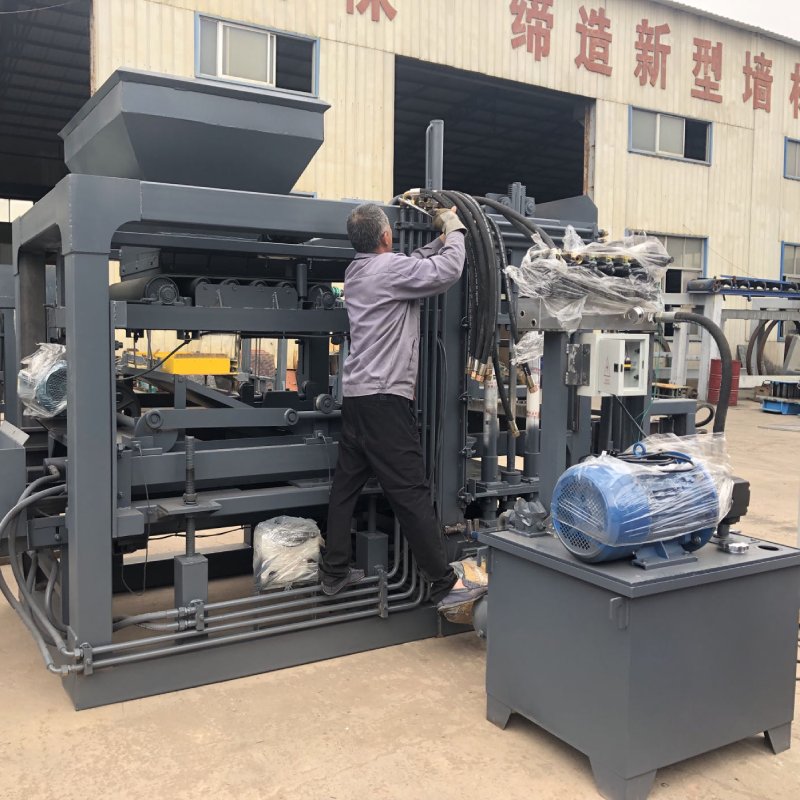
Image source Aiwei Block Machine
Innovative Robotic Technology Revolutionizes Block Brick Production
Introduction
The world of construction has been undergoing a remarkable transformation in recent years, driven by the rapid advancements in technology. One area that has seen a significant revolution is block brick production, where innovative robotic technology has emerged as a game-changer. Traditional brick manufacturing processes were labor-intensive and time-consuming, often resulting in inefficiencies and quality variations. However, the integration of robotics into brick production has led to increased precision, efficiency, and sustainability, reshaping the construction landscape. This article delves into the various ways in which innovative robotic technology has revolutionized block brick production.
1. Robotic Automation: Enhancing Efficiency
Robotic automation has breathed new life into the brick production process. Traditional methods relied heavily on manual labor, resulting in inconsistencies in brick size, shape, and quality. Robotic arms equipped with advanced sensors and computer vision technology can precisely handle raw materials, mix them in accurate proportions, and mold bricks with unparalleled precision. This not only reduces the likelihood of human error but also significantly accelerates the production process. The ability of robots to work continuously without breaks ensures uninterrupted brick production, ultimately leading to improved efficiency.
2. Customization and Flexibility
One of the remarkable benefits of robotic technology in block brick production is the level of customization it offers. Robotic systems can be programmed to create bricks of various shapes, sizes, and designs, allowing architects and builders to explore innovative possibilities. Whether it’s producing specialized bricks for intricate architectural designs or adapting to specific project requirements, robotic brick makers provide unparalleled flexibility. This capability not only fosters creativity but also enables construction projects to be tailored to the unique needs of clients.
3. Quality Assurance and Consistency
Achieving consistent quality in brick production has been a long-standing challenge. Robotic technology addresses this issue head-on by ensuring every brick meets stringent quality standards. Robots are equipped with advanced monitoring and quality control systems that continuously assess the size, shape, and texture of each brick produced. Any deviations from the desired specifications are immediately flagged, allowing for real-time adjustments. As a result, the finished bricks are of uniform quality, reducing wastage and enhancing the overall reliability of the construction materials.
4. Safety and Working Conditions
Traditional brick manufacturing processes often exposed workers to hazardous environments and physically demanding tasks. Robotic technology eliminates the need for human operators to handle heavy materials and operate in potentially dangerous conditions. This shift not only improves the safety and well-being of workers but also attracts a new generation of talent to the construction industry. The integration of robotics encourages a safer and more attractive work environment, contributing to a positive image for the industry as a whole.
5. Sustainability and Green Initiatives
In recent years, sustainability has become a central focus in the construction industry. Robotic brick makers align with these eco-friendly goals by promoting sustainable practices. These machines are designed to minimize material wastage through precise measurement and efficient use of raw materials. Additionally, some robotic systems incorporate recycling capabilities, allowing for the repurposing of construction waste into new bricks. As a result, the environmental impact of brick production is reduced, contributing to a more sustainable construction process.
6. Data-Driven Insights
The integration of robotics and automation generates a wealth of data that can be leveraged for continuous improvement. Sensors and cameras on robotic brick makers capture real-time data on production rates, material usage, and quality metrics. Analyzing this data provides valuable insights into process optimization, allowing manufacturers to fine-tune their operations for maximum efficiency and quality. The ability to make data-driven decisions leads to better resource allocation, reduced downtime, and overall improved performance.
7. Collaborative Construction: Humans and Robots
Contrary to fears of job displacement, the integration of robots into brick production has shown the potential for collaboration between humans and machines. While robots handle the repetitive and physically demanding tasks, human workers can focus on higher-level activities such as design, maintenance, and quality control. This collaborative approach not only enhances productivity but also upskills the workforce, enabling them to operate and maintain advanced robotic systems.
Conclusion
Innovative robotic technology has undeniably revolutionized block brick production, ushering in a new era of efficiency, precision, and sustainability. The integration of robotics into the manufacturing process has transformed traditional brick making, offering benefits such as increased customization, consistent quality, enhanced safety, and a reduced environmental footprint. As the construction industry continues to evolve, the adoption of robotic brick makers paves the way for a more efficient, flexible, and innovative future in construction.
